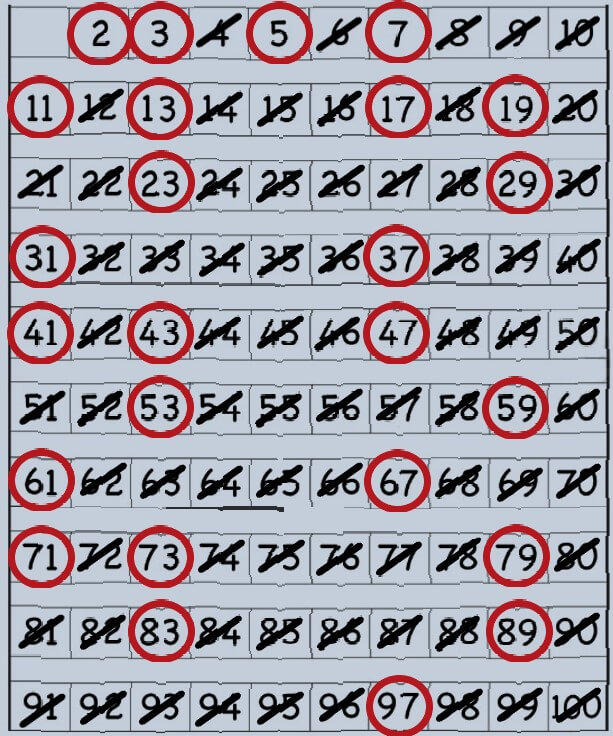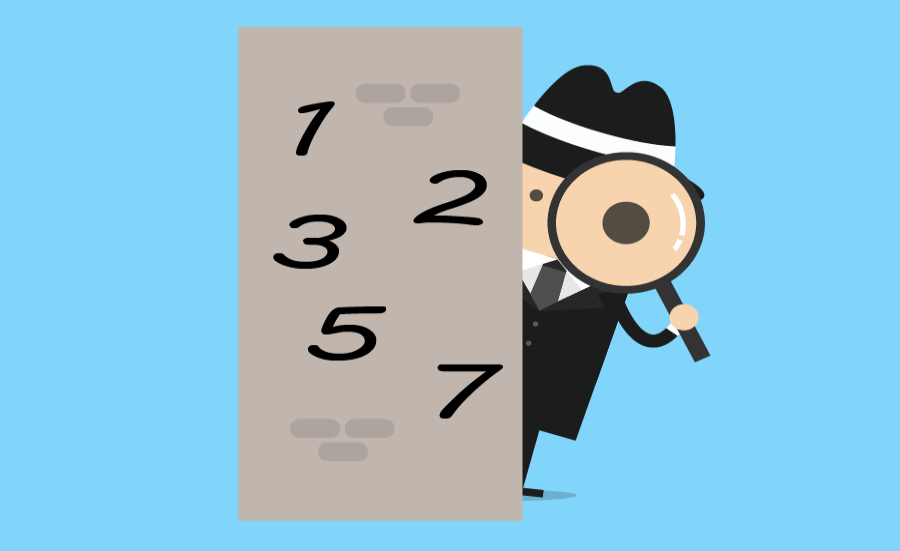In this article, we will explore prime numbers. We will look at a brief description of prime numbers. Then, we will learn about prime numbers from 1 to 1000. We will also look at some examples of prime numbers and some of the most frequently asked questions.
What are prime numbers?
A prime number is a positive integer that has exactly two factors. If x is a prime number, then necessarily its only factors are 1 and x.
Any other positive integer that does not meet these conditions is called a composite number, which means that it has factors other than 1 and itself.
First ten prime numbers
The first ten prime numbers are 2, 3, 5, 7, 11, 13, 17, 19, 23, 29.
EXAMPLES
- 8 is not a prime number since we can divide it by 1, 2, 4 and 8 without getting a remainder.
- 7 is a prime number since we can only divide it by 1 and 7 without getting a remainder.
- 19 is a prime number since we can only divide it by 1 and 19 without getting a remainder.
- 10 is not a prime number since we can divide it by 1, 5 and 10 without getting a remainder.
Is 1 a prime number or a composite number?
The definition of prime numbers is that they are positive integers that only have two factors. Therefore, 1 is not a prime number.
1 only has one factor which is itself, therefore, the number 1 is not considered a prime number. If 1 were to be considered a prime number, we would have to redefine some mathematical properties.
1 is not a composite number either because it has no factors other than itself.
Table of prime numbers up to 100
We can create a table of prime numbers up to 100. To do this, we have to cross out all composite numbers to leave only the prime numbers. Therefore, we have to cross out the numbers that are multiples of 2, 3, 5, 7, and 11.

After crossing out the composite numbers, we obtain the following list of prime numbers from 1 to 100: 2, 3, 5, 7, 11, 13, 17, 19, 23, 29, 31, 37, 41, 43, 47, 53 , 59, 61, 67, 71, 73, 79, 83, 89, 97.
It is not necessary to memorize all the numbers, but it is advisable to memorize the small prime numbers such as 2, 3, 5, 7, 11, 13.
Prime numbers up to 1000
There are a total of 168 prime numbers from 1 to 1000. These are as follows:
2, 3, 5, 7, 11, 13, 17, 19, 23, 29, 31, 37, 41, 43, 47, 53, 59, 61, 67, 71, 73, 79, 83, 89, 97, 101, 103, 107, 109, 113, 127, 131, 137, 139, 149, 151, 157, 163, 167, 173, 179, 181, 191, 193, 197, 199, 211, 223, 227, 229, 233, 239, 241, 251, 257, 263, 269, 271, 277, 281, 283, 293, 307, 311, 313, 317, 331, 337, 347, 349, 353, 359, 367, 373, 379, 383, 389, 397, 401, 409, 419, 421, 431, 433, 439, 443, 449, 457, 461, 463, 467, 479, 487, 491, 499, 503, 509, 521, 523, 541, 547, 557, 563, 569, 571, 577, 587, 593, 599, 601, 607, 613, 617, 619, 631, 641, 643, 647, 653, 659, 661, 673, 677, 683, 691, 701, 709, 719, 727, 733, 739, 743, 751, 757, 761, 769, 773, 787, 797, 809, 811, 821, 823, 827, 829, 839, 853, 857, 859, 863, 877, 881, 883, 887, 907, 911, 919, 929, 937, 941, 947, 953, 967, 971, 977, 983, 991, 997.
Properties of prime numbers
Some of the properties of prime numbers include the following:
- All numbers greater than 1 can be divided by at least one prime number.
- All positive integers greater than 2 can be expressed as the sum of two prime numbers.
- Except for 2, all other prime numbers are odd. This means that 2 is the only even prime number.
- All composite numbers can be factored into prime factors and they are all unique.
Examples of prime numbers
The following are some easy prime number examples and exercises:
EXAMPLES
- Is 24 a prime number?
Answer: No, 1, 2, 3, 4, 6, 12, and 24 are factors of 24. This number has more than 2 factors, so it is not a prime number.
- Is 29 a prime number?
Answer: Yes, only 1 and 29 are factors of 29. This number only has 2 factors, so it is a prime number.
- Is 311 a prime number?
Answer: Yes, only 1 and 311 are factors of 311. This number only has 2 factors, so it is a prime number.
- Is 45 a prime number?
Answer: No, 1, 3, 5, 9, 15, and 45 are factors of 45. This number has more than 2 factors, so it is not a prime number.
Frequent questions
How can we find prime numbers?
To determine if a number is prime or not, try dividing it by 2, 3, 5, 7, and 11. If the number is exactly divisible for these numbers, then it is composite, otherwise, it is prime.
Can prime numbers be negative?
No, a prime number cannot be negative. According to this definition, a prime number is a number greater than 1 that is only divisible by itself and by 1.
How many factors does a prime number have?
A prime number has exactly two factors, 1 and itself.
What is the largest known prime number?
The largest known prime number as of November 2020 is 282,589,933 − 1. This number was found through computational numerical methods.
See also
Interested in learning more about prime numbers? Take a look at these pages:




